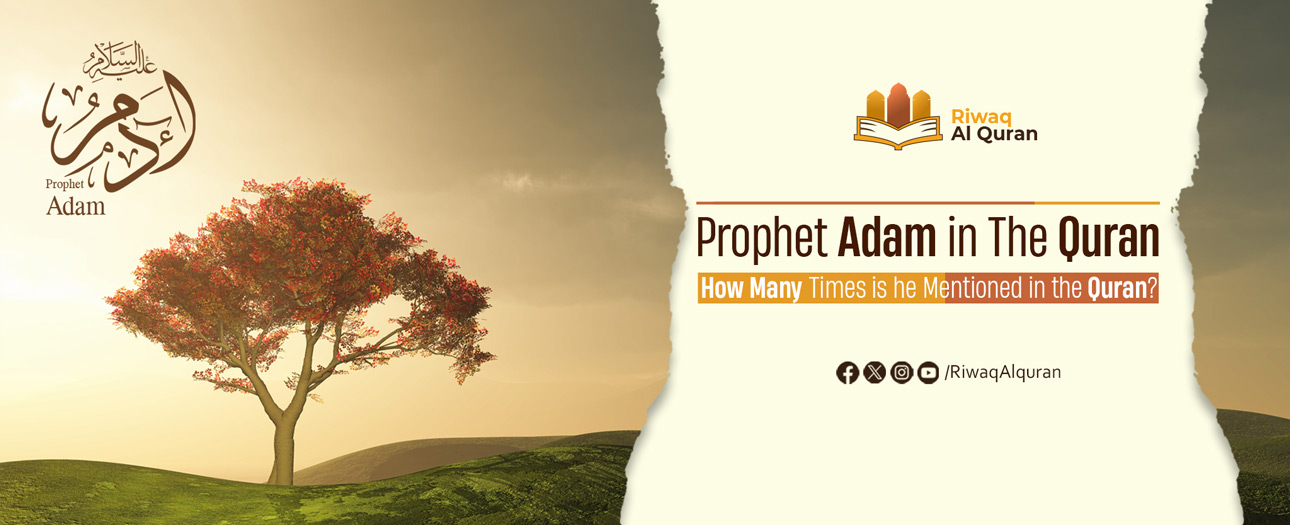Prophet Adam’s story in the Quran is a powerful narrative of creation. As the first human and prophet, his experiences teach us about repentance, obedience, and the constant battle against Shaytan. Let’s explore the key lessons from his journey and how many times he is mentioned in the Quran, offering guidance on strengthening our faith and navigating life’s challenges with wisdom and resilience.
Table of Contents
Who Is Prophet Adam?
According to our Islamic tradition, Prophet Adam was created from clay, a unique being fashioned by Allah’s own hands and given life by His breath. The Quran narrates various aspects of Adam’s creation and his life in several verses, providing a comprehensive picture of his role.
One of the key Quranic references to is found in Surah Al-Baqarah (2:30-34):
“And when your Lord said to the angels, ‘Indeed, I will make upon the earth a successive authority.’ They said, ‘Will You place upon it one who causes corruption therein and sheds blood, while we declare Your praise and sanctify You?’ Allah said, ‘Indeed, I know that which you do not know.’
And He taught Adam the names – all of them. Then He showed them to the angels and said, ‘Inform Me of the names of these, if you are truthful.’
They said, ‘Exalted are You; we have no knowledge except what You have taught us. Indeed, it is You who is the Knowing, the Wise.’
He said, ‘O Adam, inform them of their names.’ And when he had informed them of their names, He said, ‘Did I not tell you that I know the unseen of the heavens and the earth? And I know what you reveal and what you have concealed.’
And [mention] when We said to the angels, ‘Prostrate before Adam’; so they prostrated, except for Iblees. He refused and was arrogant and became one of the disbelievers.”
This passage highlights prophet Adam’s creation, his unique knowledge bestowed by Allah, and the significance of his role. It also introduces Iblees, who refused to bow to him out of arrogance, setting the stage for the ongoing struggle between good and evil.


How Many Times Is Adam Mentioned in the Quran?
Prophet Adam is mentioned by name in the Quran a total of 25 times across various Surahs. Each mention serves to reinforce different aspects of his story and the lessons to be derived from it.
1. Surah Al-Baqarah (2:31):
“And He taught Adam the names – all of them. Then He showed them to the angels and said, ‘Inform Me of the names of these, if you are truthful.'”
This verse emphasizes Adam’s unique knowledge and the honor bestowed upon him by Allah.
2. Surah Al-Baqarah (2:37):
“Then Adam received from his Lord [some] words, and He accepted his repentance. Indeed, it is He who is the Accepting of repentance, the Merciful.”
This verse highlights Allah’s mercy and readiness to forgive those who turn to Him in repentance.
3. Surah Al-A’raf (7:11):
“And We have certainly created you, [O mankind], and given you [human] form. Then We said to the angels, ‘Prostrate to Adam’; so they prostrated, except for Iblees. He was not of those who prostrated.”
Here, the focus is on the command given to the angels to prostrate to Adam, establishing his elevated status.
4. Surah Al-Hijr (15:28-29):
“And [mention, O Muhammad], when your Lord said to the angels, ‘I will create a human being out of clay from an altered black mud. And when I have proportioned him and breathed into him of My [created] soul, then fall down to him in prostration.'”
This passage details the creation process of Adam, highlighting the divine breath that brought him to life.
5. Surah Sad (38:71-72):
“[So mention] when your Lord said to the angels, ‘Indeed, I am going to create a human being from clay. So when I have proportioned him and breathed into him of My [created] soul, then fall down to him in prostration.'”
Similar to the verse in Surah Al-Hijr, this emphasizes the divine act of creation and the command for the angels to prostrate to Adam.
6. Surah Al-Isra (17:61):
“And [mention] when We said to the angels, ‘Prostrate to Adam,’ and they prostrated, except for Iblees. He said, ‘Should I prostrate to one You created from clay?'”
This verse captures the moment of Iblees’s defiance and his refusal to obey Allah’s command.
7. Surah Taha (20:115):
“And We had already taken a promise from Adam before, but he forgot; and We found not in him determination.”
This verse touches upon Adam’s forgetfulness, a human trait, and Allah’s prior covenant with him.
Know more about Prophet Zakariya In The Quran
How to Seek Refuge from the Shaytan?
The story of Prophet Adam in the Quran offers several profound lessons for believers. These lessons extend beyond the mere recounting of events, providing guidance on how to navigate life’s challenges and the constant struggle against Shaytan.
1. Understanding Human Nature and Fallibility
One of the primary lessons from the story is the recognition of human fallibility. Prophet Adam’s error in eating from the forbidden tree serves as a reminder that humans are inherently imperfect and prone to mistakes.
However, the Quran emphasizes that what defines a believer is not the absence of sin but the willingness to seek forgiveness and strive to correct one’s ways. As mentioned in Surah Al-Baqarah, Adam’s repentance was accepted by Allah, underscoring the importance of turning to Allah with sincere repentance when we err:
“Then Adam was inspired with words ˹of prayer˺ by his Lord, so He accepted his repentance. Surely He is the Accepter of Repentance, Most Merciful.”
2. The Importance of Obedience to Allah
Prophet Adam’s story teaches the significance of obeying Allah’s commands. The initial command given to Adam and his wife was clear: they were not to eat from a specific tree. Disobeying this command led to their expulsion from Paradise.
This narrative serves as a powerful reminder to Muslims about the consequences of disobedience and the importance of adhering to divine guidance. Obedience to Allah is not merely about compliance but a demonstration of trust in His wisdom and an acknowledgment of His authority.
3. The Deception of Shaytan
Shaytan’s role in Prophet Adam’s fall highlights the constant threat of deception that believers face. Shaytan’s refusal to prostrate and the subsequent efforts to mislead him symbolize his enmity towards humanity. The Quran repeatedly warns believers to be vigilant against Shaytan’s whispers. Surah Al-A’raf (7:27) advises:
“O children of Adam, let not Shaytan tempt you as he removed your parents from Paradise, stripping them of their clothing to show them their private parts. Indeed, he sees you, he and his tribe, from where you do not see them. Indeed, We have made the devils allies to those who do not believe.”
This verse serves as a caution to remain aware of Shaytan’s tactics and to seek protection through remembrance of Allah and adherence to His guidance.
4. Seeking Refuge from Shaytan
To seek refuge from Shaytan, we are encouraged to regularly recite specific prayers and verses from the Quran. One of the most well-known supplications is:
“I seek refuge in Allah from the accursed Shaytan.”
Additionally, the Quran itself provides guidance on seeking protection. Surah Al-Falaq (113) and Surah An-Nas (114) are particularly recited for protection from all forms of evil, including Shaytan’s influence. Surah An-Nas (114:1-6) specifically mentions seeking refuge in Allah from the whisperings of Shaytan:
“Say, ‘I seek refuge in the Lord of mankind, the Sovereign of mankind, the God of mankind, from the evil of the whisperer who withdraws, who whispers in the breasts of mankind, among jinn and among men.'”
5. Maintaining a Strong Connection with Allah
A strong connection with Allah is crucial in safeguarding oneself from Shaytan’s influence. Regular prayers, recitation of the Quran, and engaging in Dhikr fortify a believer’s faith and serve as a shield against evil inclinations.
The Quran encourages believers to remain steadfast in their worship and devotion, as these acts strengthen their relationship with Allah and provide spiritual protection.
6. Community and Righteous Companionship
Islam also emphasizes the importance of community and righteous companionship. Surrounding oneself with pious and sincere believers can provide support and encouragement in maintaining one’s faith and resisting Shaytan’s temptations. Prophet Muhammad advised:
“A man follows the religion of his friend; so each one should consider whom he makes his friend.” (Sunan Abu Dawood)
This hadith highlights the influence of companions on one’s spiritual journey and the need to choose friends who will positively impact one’s faith and character.


Discover the Wisdom of Prophets in the Quran with Riwaq Al Quran!
Unlock the profound wisdom of the Quran with Riwaq Al Quran. Join our courses today to explore the timeless lessons from prophets’ stories and deepen your understanding of faith, obedience, and resilience against Shaytan. Strengthen your spiritual journey, enroll now, and connect with the divine teachings of the Quran.
We offer several courses such as:
- Online courses for kids.
- Online Quran classes for kids and adults.
- Online Arabic courses
- Online Ijazah courses
- Online Islamic Studies courses.
Here are a sample of our set of Quran Courses that will be helpful for you:
- Online Tafseer Course: Delve into Quranic meanings with our insightful online Tafseer course.
- Noorani Qaida Online: Learn Quranic basics efficiently through our Noorani Qaida online program.
- Online Quran Recitation Course: Enhance Quranic recitation skills through our expert-led online course.
- Online Tajweed Classes: Master Tajweed rules for beautiful Quranic recitation in online classes.
- Quran Memorization Online Course: Memorize the Quran effectively with our specialized online memorization course.
- Online Qirat Course: Explore diverse Qirat styles with our comprehensive online Qirat course.
- Online Quran Classes for Kids: Nurture a love for the Quran in kids through interactive online classes.
Conclusion
The story of Prophet Adam in the Quran is rich with lessons that are relevant to every believer’s life. From understanding human fallibility and the importance of repentance to recognizing the constant threat posed by Shaytan and seeking refuge in Allah, Adam’s narrative provides a comprehensive guide for navigating the complexities of faith and obedience. By reflecting on these lessons and implementing them in daily life, Muslims can strengthen their relationship with Allah and protect themselves from the deceptions of Shaytan.


































